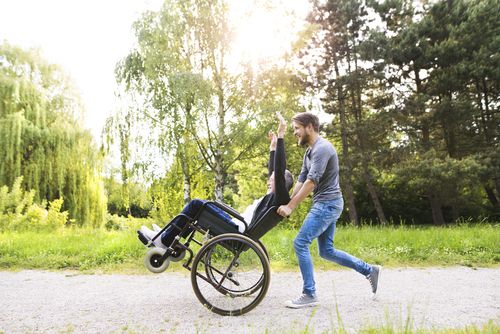 Written by Mike Price, OT
Written by Mike Price, OT
ALS, also known as Amyotrophic Lateral Sclerosis or Lou Gehrig's Disease, is a progressive neurodegenerative condition that attacks the nerve cells in the brain and spinal cord. Typically, once ALS is diagnosed, the motor neurons degenerate and the brain eventually loses the ability to control voluntary muscle movement. This makes it difficult for people living with ALS to perform many daily activities.
For many people with ALS and their loved ones, it can be a real challenge to maintain a sense of normalcy and find a way to manage daily life. Because of this, we’ve compiled some of our best tips for both caregivers and patients to help adapt to living with ALS, and make daily activities smooth and easy for everyone involved.

Living life to the fullest is important for everyone, regardless of illness, but staying connected and remaining positive is one of the most important tips we can give you. So many solutions exist to make going out significantly easier, such as The Calibrace+, which is specifically designed to improve posture and muscular support for people living with neurodegenerative conditions. But, if you still don’t feel comfortable going out or you’re more of a homebody anyway, staying in and inviting friends over is a great option as well. The main point is, don’t isolate yourself or lose contact with your loved ones. They’re here for you and they love you no matter what.
When you’re chronically ill, it makes so much of a difference to have supplies on hand if a problem arises, so that it can be tackled within a moment’s notice. This helps you and your loved ones to more easily navigate any obstacle that might come your way. Keep this bag in your car, on your wheelchair or walker, or incorporate it as part of a purse or backpack for more discreet portability. Some good examples of supplies to include in your bag are things like: tissues, wipes, a toileting aid, extra medication, and adaptive silverware.
Large parking lots can place a lot of physical strain on someone living with a chronic illness, and going out can be made so much easier if you know you can count on being able to access the proper venue with ease. Contact your local DMV to check requirements for obtaining a disability placard for your vehicle, or, for those who have the resources, it could also be beneficial to check into obtaining a wheelchair accessible van for easy loading of wheelchairs and other mobility equipment.
Since ALS progresses differently between different people, it can be hard to anticipate exactly what you might need. With this in mind, it’s still important to try and prepare for issues before they arise. For example, it could be really helpful to go ahead and start shopping for walkers, getting fitted for wheelchairs, and looking into getting assistance. Since obtaining a wheelchair or getting approved for Medicare can take time, it’s ideal to get them taken care of as soon as possible.
Everyone wants to maintain their freedom and independence, but an ALS diagnosis might make you feel like you’re racing against the clock. Participating in Physical and Occupational Therapy can make a huge difference in helping you stay strong, flexible, and mobile for as long as possible. This can help extend the amount of time you spend outside of a wheelchair, and even help you stay independent for longer.
Whether it be a close friend or relative or a hired professional, it is important to have someone on hand to help you accomplish tasks that you might not be able to on your own. Even if it isn’t with direct patient care, it’s important to have someone who can assist with things as simple as cooking meals, organizing medication, cleaning, keeping up with appointments, going grocery shopping, running errands, or even just serving as company.
As ALS progresses, there are necessary changes that have to be made to your living environment in order to make daily living safe and accessible. Simple actions such as raising toilet seats, adding a safety frame, purchasing a lift chair or putting a lift seat on your own couch or chair, or adding stability devices like bedrails or grab bars can make a world of difference in how easy it is to navigate your home. More large scale changes, such as widening doorways and adjusting shower stalls to better accommodate wheelchairs can also be a great idea for improved accessibility.
ALS can be a difficult disease to deal with, both for the person living with it and their loved ones. While there is ongoing research, there is still no cure, and that can make it difficult to remain in good spirits. Having a licensed professional to help you through can make a huge difference in your mental state, and counselors exist who specialize in helping people living with chronic and degenerative illness.
While your friends and family may have the best intentions, it still may feel isolating to live with something so outside their realm of understanding. Because of this, it’s a good idea to consider a support group for other people living with ALS. Being around people who can empathize with what you’re going through can be so validating and relieving, and you might even consider signing up your friends or family for their own support group, to help them better understand what you’re going through while also helping to relieve any negative emotions they’re feeling about the process.
ALS can be extremely challenging to live with, both for you and your loved ones, but a variety of tools and resources exist to help make life easier on all fronts. From adapting your home to seeking out support, it's important to remain proactive and keep your spirits high.
For more information on tricks and tools that can help you adapt your life for better daily living, check out Caregiver University, and browse our full catalog of high-quality assistive products at Rehabmart.com.
>> Shop Daily Living Aids <<
Co-Founder of Rehabmart and an Occupational Therapist since 1993. Mike has spent his professional career working in multiple areas of Occupational Therapy, including pediatrics, geriatrics, hand therapy, ergonomics and inpatient / outpatient rehabilitation. Mike enjoys writing articles that help people solve complex therapeutic problems and make better product choices.